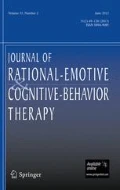Abstract
Low self-esteem is usually considered unhealthy, but according to rational-emotive behavior therapy, any level of self-esteem reflects a dysfunctional habit of globally evaluating one's worth; it would be preferable to accept oneself unconditionally. This hypothesis was tested by examining several correlates of scores on a novel questionnaire measure of unconditional self-acceptance (USA). In a nonclinical adult sample, statistically controlling for self-esteem, USA was inversely correlated with anxiety symptoms and with narcissism, positively correlated with state mood after imaginal exposure to negative events. Other predicted associations of USA (with depression, happiness, and self-deception) either were not evident or became nonsignificant when self-esteem was taken into account. Discussion centered on the conceptual and operational distinctions between self-esteem and self-acceptance.
Similar content being viewed by others
REFERENCES
Baumeister, R. F., Smart, L., & Boden J.M. (1996). Relation of threatened egotism to violence and aggression: The dark side of high self-esteem. Psychological Review, 103, 5–33.
Beck, A. T., Epstein, N., Brown, G., & Steer, R. A. (1988). An inventory for measuring clinical anxiety: Psychometric properties. Journal of Consulting and Clinical Psychology, 56, 893–897.
Beck, A. T., Rush, A. J., Shaw, B. F., & Emery, G. (1979). Cognitive therapy of depression. New York: Guilford.
Beck, A. T., Steer, R. A., Epstein, N., & Brown, G. (1990). Beck Self-Concept Test. Psychological Assessment, 2, 191–197.
Beck, A. T., Steer, R. A., & Garbin, M. G. (1988). Psychometric properties of the Beck Depression Inventory: Twenty-five years of evaluation. Clinical Psychology Review, 8, 77–100.
Cowdry, R. W., Gardner, D. L., O'Leary, K. M., Leibenluft, E., & Rubinow, D. R. (1991). Mood variability: A study of four groups. American Journal of Psychiatry, 148, 1505–1511.
Crowne, D. P., & Marlowe, D. (1960). A new scale of social desirability independent of psychopathology. Journal of Consulting Psychology, 24, 349–354.
Davison, G. C., Robins, C., & Johnson, M. K. (1983). Articulated thoughts during simulated situations: A paradigm for studying cognition in emotion and behavior. Cognitive Therapy and Research, 7, 17–40.
Davison, G. C., Vogel, R. S., & Coffman, S. G. (1997). Think-aloud approaches to cognitive assessment and the articulated thoughts in simulated situations paradigm. Journal of Consulting and Clinical Psychology, 65, 950–958.
Eisenberg, N., & Okun, M. A. (1996). The relations of dispositional regulation and emotionality to elders' empathy-related responding and affect while volunteering. Journal of Personality, 64, 157–183.
Ellis, A. (1962). Reason and emotion in psychotherapy. New York: Lyle Stuart.
Ellis, A. (1973). Humanistic psychotherapy: The rational-emotive approach. New York: Julian.
Ellis, A. (1976). RET abolishes most of the human ego. Psychotherapy: Theory, Research, and Practice, 13, 343–348.
Ellis, A. (1977). Psychotherapy and the value of a human being. In A. Ellis & R. Grieger (Eds.), Handbook of rational-emotive therapy (pp. 99–112). New York: Springer.
Ellis, A. (1995). Changing rational-emotive therapy (RET) to rational emotive behavior therapy (REBT). Journal of Rational-Emotive and Cognitive-Behavior Therapy, 13, 85–89.
Ellis, A., & Dryden, W. (1997). The practice of rational emotive behavior therapy (2nd edn.). New York: Springer.
Ellis, A., & Harper, R. A. (1997). A guide to rational living (3rd Ed.). North Hollywood, CA: Wilshire.
Ellis, A., & Tafrate, R. C. (1997). How to control your anger before it controls you. Secaucus, NJ: Carol.
Engels, G. I., Garnefski, N., & Diekstra, R. F. W. (1993). Efficacy of rationalemotive therapy: A quantitative analysis. Journal of Consulting and Clinical Psychology, 61, 1083–1090.
Fordyce, M. W. (1988). A review of research on the Happiness Measures: A sixty second index of happiness and mental health. Social Indicators Research, 20, 355–381.
Haaga, D. A. F., & Davison, G. C. (1989). Outcome studies of rational-emotive therapy. In M. E. Bernard & R. DiGiuseppe (Eds.), Inside rational-emotive therapy: A critical appraisal of the theory and therapy of Albert Ellis (pp. 155–197). San Diego, CA: Academic Press.
Mecca, A. M., Smelser, N. J., & Vasconcellos, J. (Eds.) (1989). The social importance of self-esteem. Berkeley, CA: University of California Press.
Meston, C. M., Heiman, J. R., Trapnell, P. D., & Paulhus, D. L. (1998). Socially desirable responding and sexuality self-reports. The Journal of Sex Research, 35, 148–157.
Norusis, M. J. (1990). SPSS introductory statistics student guide. Chicago, IL: SPSS Inc.
Pavot, W., & Diener, E. (1993). Review of the Satisfaction with Life Scale. Psychological Assessment, 5, 164–172.
Raskin, R., & Hall, C. S. (1979). A narcissistic personality inventory. Psychological Reports, 45, 590.
Raskin, R., & Hall, C. S. (1981). The Narcissistic Personality Inventory: Alternate form reliability and further evidence of construct validity. Journal of Personality Assessment, 45, 159–162.
Raskin, R., & Terry, H. (1988). A principal-components analysis of the Narcissistic Personality Inventory and further evidence of its construct validity. Journal of Personality and Social Psychology, 54, 890–902.
Robinson, J. P., & Shaver, P. R. (1973). Measures of social psychological attitudes. Ann Arbor, MI: Institute for Social Research.
Rogers, C. R. (1951). Client-centered therapy: Its current practice, implications, and theory. Boston: Houghton Mifflin.
Rosenberg, M. (1965). Society and the adolescent self-image. Princeton, NJ: Princeton University Press.
Schlenker, B. R., Soraci, S., & McCarthy, B. (1976). Self-esteem and group performance as determinants of egocentric perceptions in cooperative groups. Human Relations, 29, 1163–1176.
Shrauger, J. S., & Lund, A. K. (1975). Self-evaluation and reactions to evaluations from others. Journal of Personality, 43, 94–108.
Solomon, A., Haaga, D. A. F., Brody, C., Kirk, L., & Friedman, D. G. (1998). Priming irrational beliefs in recovered-depressed people. Journal of Abnormal Psychology, 107, 440–449.
Tarlow, E. M., & Haaga, D. A. F. (1996). Negative self-concept: Specificity to depressive symptoms and relation to positive and negative affectivity. Journal of Research in Personality, 30, 120–127.
Weinberger, D. A. (1990). The construct validity of the repressive coping style. In J. L. Singer (Ed.), Repression and dissociation: Implications for personality theory, psychopathology, and health (pp. 337–385). Chicago: University of Chicago Press.
Author information
Authors and Affiliations
Rights and permissions
About this article
Cite this article
Chamberlain, J.M., Haaga, D.A.F. Unconditional Self-Acceptance and Psychological Health. Journal of Rational-Emotive & Cognitive-Behavior Therapy 19, 163–176 (2001). https://doi.org/10.1023/A:1011189416600
Issue Date:
DOI: https://doi.org/10.1023/A:1011189416600




